10 Healthy Snack Bar Brands

Key Takeaways
We all try incorporating healthy foods, such as raw vegetables, lean meats, and whole grains, into our meals. But there are times when we just don't have time for a big healthy breakfast, and there are other times when we crave a sweet snack.
Although you can make healthy snacks such as homemade granola bars or energy balls, why not add a few quick, convenient to-go options to your list?
And if you're thinking, 'Why not just pack some fresh fruit and veggie sticks?' While they're healthy, you need to pack them in airtight containers to keep them fresh; they don't last that long, and sometimes, you just need something that requires no prep. So, what are some healthy snack options that are portable and easy to grab on the go?
This is where snack bars come in. Snack bars are a popular on-the-go option that provide a balance of nutrients and convenience. They are easy to pack, require no preparation, and can satisfy hunger pangs throughout the day.
But despite what their clever marketing would have you believe, not all snack bars are healthy options, even when they claim to be. With so many options ranging from Clif bars to Larabars, Kind bars, RX bars, and Kashi bars, how do you figure out what's best for your health?
What ingredients on the nutritional labels should you look for or avoid? Which brands are trustworthy? Read on for a nutritionist-approved breakdown of healthy snack bar brands, including gluten-free, dairy-free, keto, and vegan options!
10 Healthiest Snack Bar and Snack Packet Brands
When it comes to healthy snack bar choices, you'll want to look for relatively simple, whole-food ingredients. Nutritionist Amanda Donahue, MS, RD, CD, adds, “I normally look at fiber and protein amounts as well as carbs depending on my needs and health goals.”
We've got a few favorites here at Nutrisense, so if you want a few recommendations, here are our top 10 snack bar brands, recommended by our health experts. Plus, some bonus snack options that aren't technically bars but are just as accessible, convenient, and healthy.
1) RXBAR
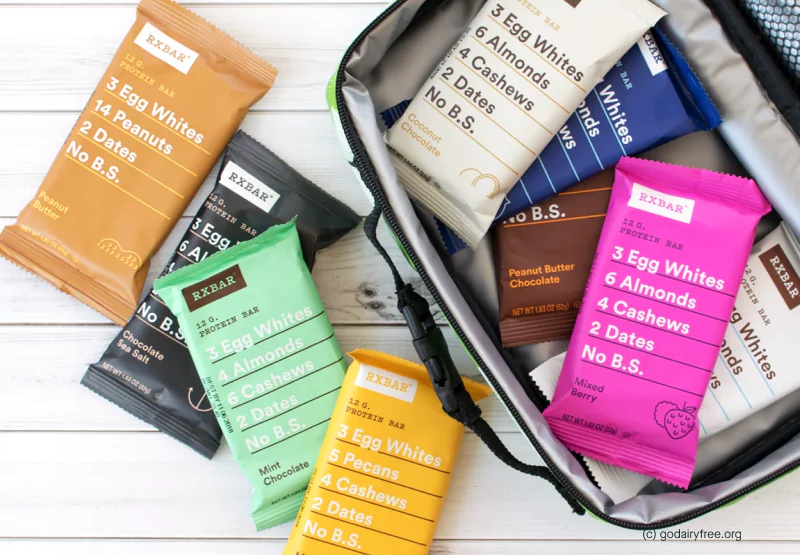
You may already be familiar with RXBARs, protein bars made of whole foods. Many of these bars are made from things such as egg whites, cashews, almonds, and dates, making them a good source of protein and healthy fats.
While the nutritional content varies by flavor, RXBARs contain no added sugars. Each portion size for this protein bar usually has around five grams of fiber and around 12 grams of protein.
Their bars are available in strawberry, chocolate, honey, cinnamon, and peanut butter flavors, as well as seasonal flavors like pecan, pumpkin spice, and gingerbread. Many are also gluten-free and dairy-free.
They also sell nut butter in flavors like vanilla almond butter, chocolate peanut butter, and coconut almond butter. These can be a great option if you're in need of a quick boost of protein, healthy fat, and fiber throughout the day.
2) Epic Provisions
Epic Provisions sells meat bars that include a wide range of flavors like Bison Bacon Cranberry, Sea Salt and Pepper Venison, Lean Beef Apple Bacon, and Chicken Sriracha. Their website conveniently lists which options are keto, paleo, and whole 30-friendly.
This brand also has snack strips that are more like jerky, like wagyu beef and smoked salmon snack strips, as well as bite-sized snacks, like beef liver and salmon bites.
The nutritional content of their bars varies, but most contain seven to 12 grams of protein and zero to three grams of fiber. Many options contain zero grams of sugar and are gluten-free and dairy-free.
3) Wild Zora
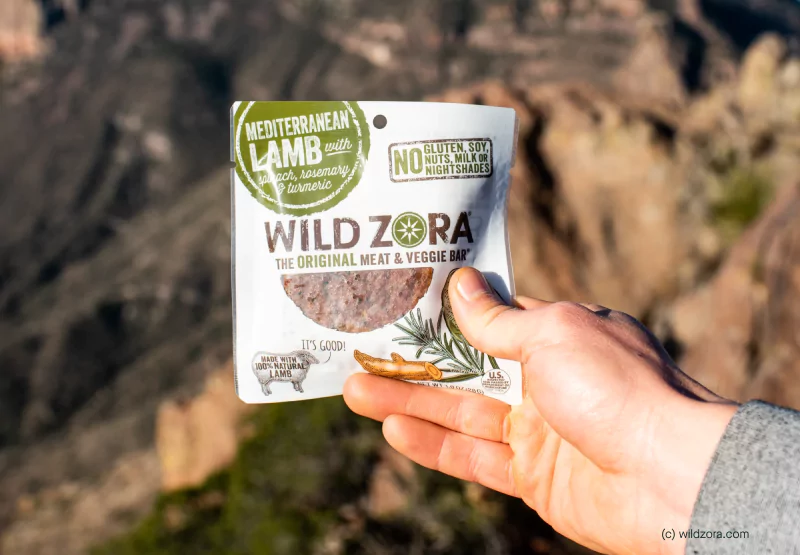
Wild Zora makes meat and vegetable bars with flavors like apple pork, curry turkey, and Mediterranean lamb. The bars are paleo, gluten-free, dairy-free, and contain no added sugars.
Some of their blends are slightly lower in protein, at just six grams, but two packs would make a great snack, with 12 grams of protein and 16 grams of carbs.
4) Skout
Skout Organic makes high-protein snack bars that are organic, non-GMO, and plant-based. They are also gluten-free, vegan, and kosher and have less than seven ingredients.
These bars include matcha almond, salted chocolate, cinnamon raisin, and coconut vanilla flavors. They're also a good option for plant-based protein— they contain 10 grams of protein per bar!
5) Brami Lupini Beans
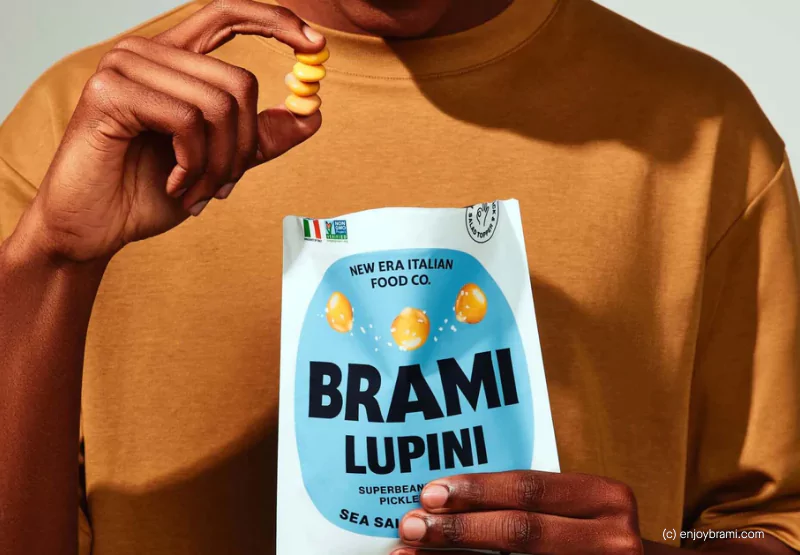
Brami's packets of lupini beans aren't bars per se, but they are just as portable, easy, and nutritious. Lupini beans are legumes common in Italian, Middle Eastern, and Mediterranean cuisine.
They are highly nutritious and full of protein and fiber. Brami's versions are pickled, vegan, and don't contain gluten. They come in flavors like garlic, rosemary, chili, lime, sea salt and vinegar.
One pack contains around four grams of protein.
6) PaleoValley Superfood Bars
These superfood bars from PaleoValley are nutrient-dense, gluten-free, grain-free, soy-free, and added sugar-free! They contain 9 grams of protein per bar derived from 100 percent grass-fed bone broth protein. Each bar contains nutritious superfoods such as spirulina, turmeric, ginger, and Himalayan pink salt.
These bars come in five different flavors: red velvet, lemon meringue, dark chocolate chip, apple cinnamon, and pumpkin spice.
7) Sahale Bean and Nut Snack Mix
Sahale Snacks' bean and nut snack mix is gluten-free, vegan, and kosher, and contains no artificial preservatives, colors, or flavors. One pack has three grams of fiber, and is a little lower than ideal in protein (with just six grams) but still makes a healthy snack!
8) Mountain America Jerky
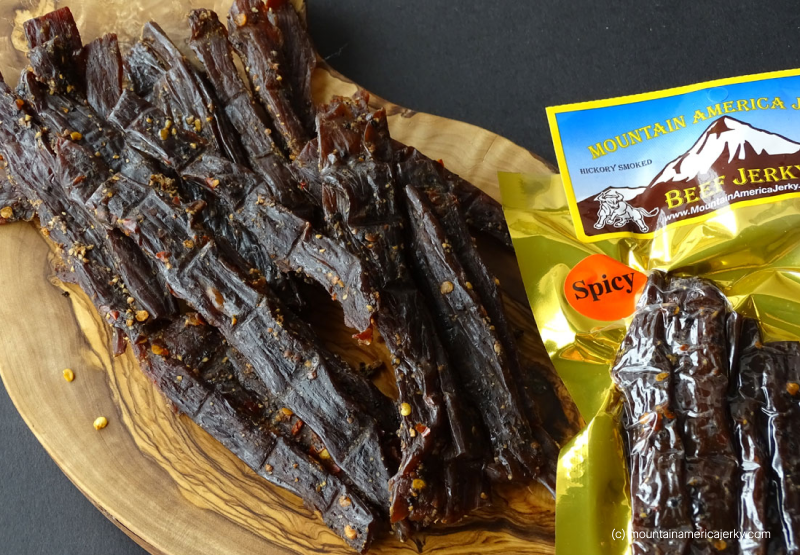
Mountain America Jerky sells a wide selection of gourmet jerky, including trout, salmon, tuna, elk, and gluten-free jerky. The jerky contains natural ingredients, with no nitrates or nitrites.
9) Yupik
Yupik sells dry-roasted edamame snacks that only contain edamame and salt. These snacks contain 11 grams of protein and three grams of fiber. They also sell dry roasted chickpeas containing eight grams of protein and five grams of fiber.
Their super six-seed mix contains brown and golden flax seeds, sunflower seeds, sesame seeds, black chia seeds, and pumpkin seeds, all of which are organic.
The mix is a little lower in protein, at six grams, but it contains a whopping nine grams of fiber!
10) Perfect Bar
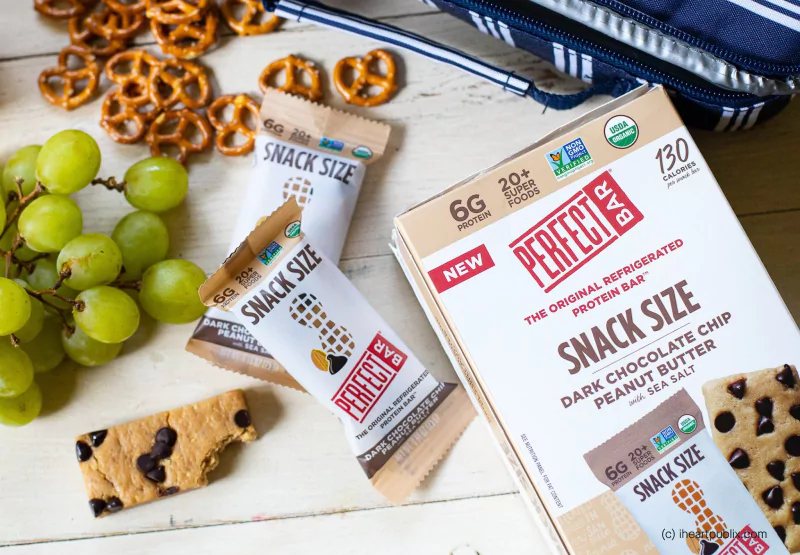
Perfect Snack's protein bars aren't made from 100 percent whole foods, but they are comparably lower in processed foods than many other options! Their bars contain primarily organic and fair trade ingredients and are gluten-free.
Their protein content ranges from 12 to 17 grams. You'll want to keep in mind, however, that these bars can be a little higher in added sugars. The chocolate mint flavor, for example, has 12 grams of added sugar.
What Makes a Healthy Snack Bar?
No single ingredient makes a snack "healthy." A snack's health depends on the quality of its ingredients, its nutritional content, and how well it fits into your specific diet preferences and health needs.
But, if you want to know how good something may be for your health, here are a few questions to ask yourself:
How Processed Is It?
Processed foods in moderation may not be harmful. Still, over-reliance on them may have negative health effects over time. Highly processed foods contain more ingredients like refined sugar, high salt content, and trans fats.
These can all contribute to the development of serious health problems. They also likely contain more preservatives and food additives that may have negative health effects.
Ingredients with names you don't recognize or wouldn't find in an average kitchen are a dead giveaway for highly processed unhealthy foods. These may include::
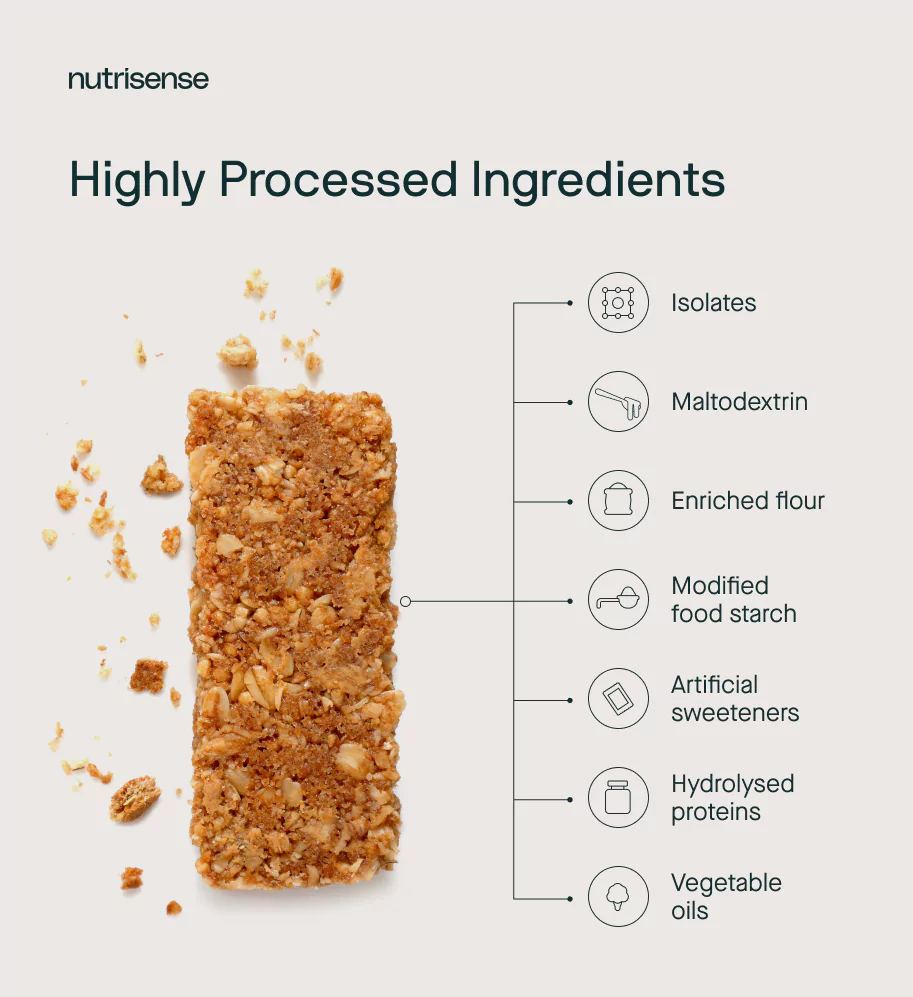
- Hydrolysed proteins
- Isolates, such as protein isolate powder or soy protein isolate
- Enriched flour
- Modified food starch
- Certain oils, like hydrogenated oil and oils from seeds, like canola oil
- Maltodextrin
- Artificial sweeteners like saccharin, sucralose, aspartame, or high-fructose corn syrup
Some of the negative effects associated with highly processed foods include inflammation, high blood sugar, obesity, hypertension, coronary disease, metabolic syndrome, digestive issues, and an increased risk of cancer.
Just because a snack bar is advertised as a "whole food," it does not necessarily mean it's made of whole food ingredients. The best way to see if your snack bar is a highly processed food is to check its list of ingredients.
Does It Contain Whole Foods?
Whole foods are those that haven't been processed, such as whole fruits, vegetables, legumes, protein, and whole grains. They are naturally more nutritious and balanced.
Check your snack bar's ingredients list for whole food ingredients like:
- Seeds and nuts
- Whole grains, like rolled oats, buckwheat, or quinoa
- Protein from whole animal sources, like jerky or fish
- Eggs
- Sugars from whole fruits
What’s the Nutritional Value?
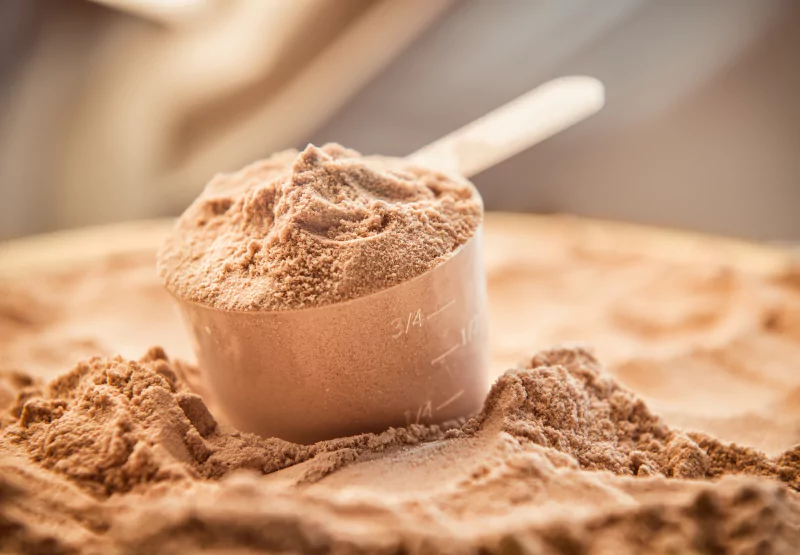
The nutritional value of your snack bar is an important consideration. Look through the ingredients list and nutritional label for the bar's macronutrient content: protein, carbs, and fats.
You'll also want to be aware of micronutrients (vitamins and minerals) as they offer plenty of health benefits. More on this below!
Protein
Protein content is the first thing to check, especially if the snack bar is labeled "protein bar." Some actually have very little protein! Our nutritionists at Nutrisenses recommend aiming for a bar with no less than eight to 10 grams of protein if you can.
Carbohydrate Needs
Your carb needs may vary depending on your diet. If you're following a low-carb diet, you'll want fewer carbs.
Depending on your unique needs, you may look for something containing anywhere from five to 30 grams of carbs. You would want your carb nutrition sources mostly from whole grain, starchy veggies, or whole fruit content rather than added sugars.
The fat content will also vary, but most snack bars contain five to 10 grams of fat. If you're unsure of how many carbohydrates are optimal for your overall wellness, consider consulting a credentialed expert like a registered dietitian or nutritionist for nutrition advice.
Micronutrients
Whole foods are naturally rich in vitamins and minerals. However, some snack bars are so processed that they lose much of their inherent micronutrient value.
Many companies may add additional nutrient supplements, such as paprika, mushroom, and spirulina extract, to the mix, making the snack bar more of a supplement than a food. To ensure you're consuming adequate amounts of your micronutrients, keeping tabs on which foods you're eating may contain added supplements is a good idea.
Fiber
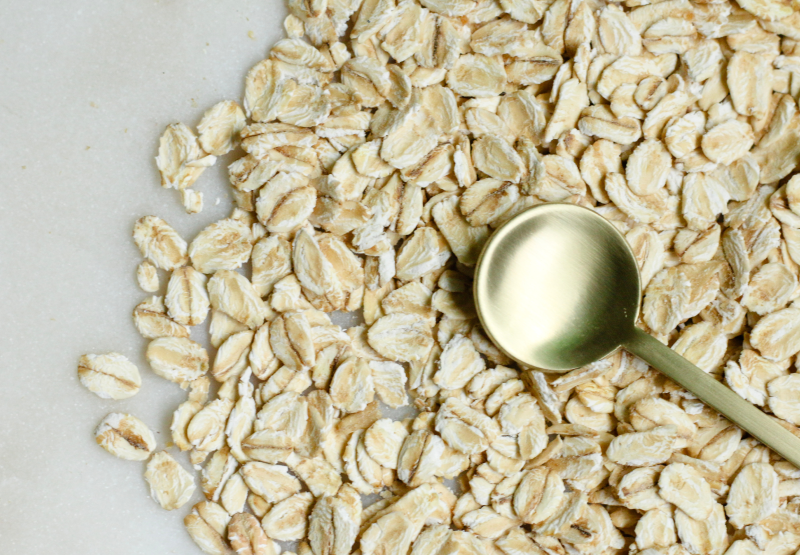
Fiber is a crucial nutrient and an important component of many snack bars. Look for fiber from whole foods, like oats, seeds, nuts, and fruits.
At the same time, you may want to keep an eye on fiber additives or "refined dietary fibers" (RDFs) like inulin and bran extract. Research suggests that higher consumption of RDFs may negatively impact gastrointestinal and liver health.
Some people may have different digestive responses to different fiber types and additives.
Added sugar
The American Heart Association recommends limiting sugar consumption to no more than six percent of daily calories. If you eat more, your risk of these negative effects may increase.
Many snack bars have a surprising amount of added sugars, especially granola bars. These can come in many forms, such as high fructose corn syrup, honey, agave nectar, and more. While natural sugars from fruits or nuts are okay, high sugar intake can spike your blood sugar levels and contribute to weight gain and tooth decay.
Each of these bars contains a low amount of protein and a significant amount of added sugar, so you may want to consume these less-healthy options in moderation.
Snack bars can be handy when you're on-the-go or in a hurry. Whether you're on a hike, traveling, enjoying a bike ride, running errands, or just want to have an emergency snack to keep with you, these bars are a convenient treat.
Other Sneaky Unhealthy Ingredients in Snack Bars
Here are a few things to watch out for when choosing your next snack bar:
- Hydrogenated oils: Some of the most common in snack bars are palm oil, soybean oil, vegetable oil, and canola oil. These oils are often partially hydrogenated, which means they contain trans fats that can increase your cholesterol levels and raise your risk of heart disease. Instead, opt for coconut oil, hemp oil, olive oil, or avocado oil.
- Artificial colors and flavors: These are added to make snack bars look more appealing and taste better. However, artificial colors have been linked to hyperactivity in children, while artificial flavors may contain harmful chemicals. Instead, choose products with natural coloring and flavors made with cruciferous vegetable juice or fruit juice such as beet juice, apple juice, grape juice, and blueberry juice.
- Preservatives: These are added to prolong the shelf life of snack bars, but they can also have negative health effects. Common preservatives include BHT, BHA, and TBHQ, which have been linked to cancer and other diseases.
- Soy protein isolate: This highly processed form of soy is often used in snack bars as a cheap source of protein and dairy products. However, soy is a common allergen and may also contain GMOs. Look for snack bars made with whole food protein sources such as nuts, seeds, and quinoa.
- Chocolate: Not all chocolate is created equal. Many snack bars contain these mini chocolate chips that may be made with unhealthy oils, artificial flavors, and excessive sugar. Look for dark chocolate or cacao nibs as a healthier alternative.
- High salt content: High sodium intake can increase some people's risk of high blood pressure and heart disease. Many snack bars are loaded with salt to enhance the flavor, so it's important to check the nutrition label and choose options with lower sodium content. Remember, there’s no one-size-fits-all. Nutritionist Amanda Donahue, MS, RD, CD explains, “Even with salt intake, ‘high’ means different things for different people. Certain sodium intake could be a risk for some and not others, as some may need the salt or not be as affected. It’s best to check how your body responds and with a health expert to ensure it’s the right fit for your needs.”
Other ingredients to watch out for in snack bars include brown rice flour and barley malt extract. These ingredients can contribute to inflammation, weight gain, and other health issues.
Find the right Nutrisense programto turn insight into progress.
Find How Your Body Responds to Various Snack Bars with Nutrisense
Recommendations are great, but if you really want to pick the perfect snack bar, consider monitoring and tracking your body's response to various options.
You may be surprised to learn that some seemingly healthy snack bars may spike your blood sugar, leading to energy crashes and cravings for more sugary treats. Instead of trying to wade through the overwhelming, one-size-fits-all recommendations, let Nutrisense help you make more informed decisions about your food choices.
You can work 1:1 with a personal, credentialed nutritionist, who will help you understand your body's responses to food, exercise, sleep, stress, and more with data insights from a continuous glucose monitor (CGM). This lets you see how ingredients like added sugars and refined grains impact your body in real-time.
With this valuable information, you can choose snack bars that are truly good for your health and blood sugar levels. Start your health journey with Nutrisense today!
Go Beyond Glucose Data with Nutrisense
Your glucose can significantly impact how your body feels and functions. That’s why stable levels are an important factor in supporting overall wellbeing. But viewing glucose isn't enough. Nutrisense, you’ll be able to learn how to use your body's data to make informed lifestyle choices that support healthy living.
One-to-one coaching
Sign up to access insurance-covered video calls to work with a glucose expert: a personal registered dietitian or certified nutritionist who will help tailor your lifestyle and diet to your goals.
Monitor and measure what matters
With the Nutrisense CGM Program, you can monitor your glucose with health tech like glucose biosensors and continuous glucose monitor (CGM)s, and analyze the trends over time with the Nutrisense App. This will help you make the most informed choices about the foods you consume and their impact on your health.
Find your best fit
Ready to take the first step? Start with our quiz to find the right Nutrisense program to help you take control.

Heather is a Registered and Licensed Dietitian Nutritionist (RDN, LDN), subject matter expert, and technical writer, with a master's degree in nutrition science from Bastyr University. She has a specialty in neuroendocrinology and has been working in the field of nutrition—including nutrition research, education, medical writing, and clinical integrative and functional nutrition—for over 15 years.




